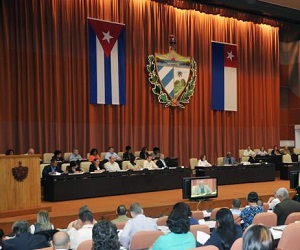 The National Assembly of People’s Power is addressing a number of important issues during its Second Period of Ordinary Sessions underway in Havana, including constitutional reform, and the 2019 Economic Plan.
The National Assembly of People’s Power is addressing a number of important issues during its Second Period of Ordinary Sessions underway in Havana, including constitutional reform, and the 2019 Economic Plan.
After the proposed draft Constitution was submitted to a broad popular discussion, with 8,945,521 Cubans participating, the text returns to the National Assembly of People’s Power Ninth Legislature to be debated during its Second Period of Ordinary Sessions.
Prior to this final review, and based on evaluations and suggestions from work groups charged with analyzing and processing proposals made by the population, the National Assembly commission drafting the new Constitution – headed by Army General Raúl Castro Ruz, first secretary of the Communist Party of Cuba Central Committee – agreed to propose a series modifications to the text under consideration.
Among other issues to be addressed by the National Assembly during this period of sessions is a performance report on the 2018 Economic Plan and next year’s projections, along with the proposed 2019 State Budget.
During standing committee meetings, deputies considered issues related to the implementation of policies for strategic sectors of the economy and society, as well as the results of inspections and audits carried out.
Estimates indicate that the Cuban economy will show growth of the Gross Domestic Product (GDP) slightly higher than 1%, “but this growth, although discreet and still without the impact we need for the population, is meritorious given the conditions in which it was achieved, without deficit in our running accounts, as a result of measures taken, especially in the second half of the year.” This is how Cuban President Miguel Díaz-Canel Bermúdez described the current situation, during a meeting of the National Assembly’s Economic Affairs Standing Committee.
Commenting on deficiencies noted in execution of the 2018 Plan, he acknowledged that many are due to the complex economic situation we face, and related to problems accumulated on the structural order, as well as those of our own making that we must resolve. Nor can the impact of the blockade be underestimated, he said, which has worsened under the Trump administration, especially financial persecution internationally.
Díaz-Canel reiterated that the economic battle continues to be the fundamental task, and the most difficult, saying, “The people expect an economic response that impacts daily life. That’s why most of our time must be directed toward this battle, to see how we can remove obstacles on the road to solving these economic problems.
Results from the audit of housing construction and rehabilitation programs; the granting of subsidies; and local production of materials were evaluated in the standing committees focused on Economic Affairs and on Industry, Construction and Energy.
During the Standing Committee on Attention to Services, President Díaz-Canel stated that the government is intent upon continuing to advance in the computerization of society.
He noted that this process is already a reality, consolidated step by step and carried out in the context of a difficult economic situation and an aggressive subversion campaign attempting to draw Cubans to access the internet via imperialist projects.
He announced that the country’s Presidency will soon launch a website, a YouTube channel, and a Twitter account to address more institutional issues and interact with the population as needed.
Deputies also learned details of the National Water Plan, a program that extends through 2030, in line with the country’s Economic and Social Development Plan.
The infrastructure development strategy through 2030 was explained, including investment projects to assure the population’s water supply, serve agriculture, and tourism, as well as plans to continue repairs of distribution systems; expand service and improve the quality of potable water; and renovate sewers, drainage, and waste treatment plants.
These and other efforts connected to the climate change mitigation project, Tarea Vida, were also discussed.
The Standing Committee on Attention to Services, considered the results of an audit conducted to evaluate implementation of the Ministry of Commerce’s Resolution 54 on consumer protection, the price-controlled basket of basic foods, retail commerce, and prioritized programs.
Meanwhile, in the Health and Sports Standing Committee, a report was presented on progress made since 2012 in efforts to increase the country’s birth rate, and respond to the Party policy guideline calling for attention to the demographic situation, leading to the development of a program by the Ministry of Public Health to serve infertile couples.
This network now provides services nationwide, with well-equipped provincial centers, according to the report to deputies.
(Granma)